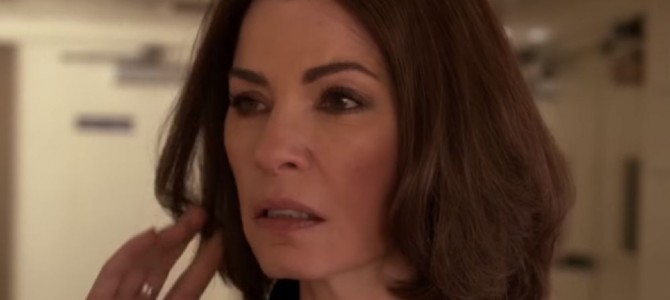
It’s very appropriate that CBS’ “The Good Wife” ended at exactly the moment when Awful Man and Grasping Woman are preparing to face off in a real, live national election. The curtain falls on Alicia Florrick even as it rises on an equally cutthroat political and domestic drama. Was this whole series just an opener for the 2016 election?
“The Good Wife” was one of the best shows on television for several years running, with the late seasons including some of the most robust defenses of conservative positions in any contemporary television show. However, if you’re looking to forge a happy marriage, look elsewhere. This is not a show about matrimonial bliss. It’s about clinging to a few shreds of personal integrity in a world of blinding ambition, heartache and betrayal.
Standing By Her Man
“The Good Wife” takes its premise from a depressingly familiar scene. A philandering politician gets caught, and expresses his regrets at a press conference with a mob of cameramen in front of him and his grim-faced wife behind. We feel awful for her. Already she’s had to endure deep personal betrayal and intense public humiliation. Despite everything, merciless campaign strategists drag her into the limelight in a display of “support” for her cheating, lying scumball of a husband. This is everything we hate most about electoral politics.
“The Good Wife” brings that grim-faced prop into full focus as a strong, dynamic character. Why does she do it? How does she really feel? Once her heinous photo op has passed, where does she go from there?
Straight to the top, of course. Considering that this is television, we are un-shocked to find that the woman in the background is far more brilliant, beautiful, and all-around talented than her contemptible husband. We could have predicted from the get-go that there would be a strong strand of “You Go Girl” in a show about the ruined politician’s “good wife.”
What’s really shocking is that the show was so good. CBS managed to beat back the horde of clichés waiting in the wings, and made a compelling, morally nuanced drama. For that to be possible, however, the writers clearly realized they had to resist fairy-tale resolutions. Their characters live in a jungle of shifting deals and alliance in which all relationships are open to negotiation and exploitation. What does that mean for domesticity? Nothing good.
Until Merger Do Us Part
As a legal procedural and political drama, “The Good Wife” is smart, nuanced and interesting. As a matrimonial tutorial, its moral is not so subtle. Marriage is doomed.
Alicia stays married to her corrupt politician husband (Peter Florrick) for the duration of the series in a Clintonesque, symbolic alliance of un-lovers. The final season flirts with the possibility that she may be about to divorce him, and the final episode seems to confirm that a divorce is imminent. (“It’s the smart thing to do,” says Eli Gold, the campaign strategist, as Peter prepares to resign the Illinois governorship after yet another scandal.)
It isn’t a happy marriage, but still, the Florricks do rack up a lot of wedded years. Sham marriages may be thin on hearts and flowers, but at least give them this: they seem to be the only kind that lasts in this grim universe.
Virtually everyone in this show is either never-married or divorced. We hear rumors that one major character (Kalinda Sharma) is hiding from an abusive ex, while two recurring characters (Colin Sweeney and Lemond Bishop) actually murdered their former wives. The single most crass and calculating member of the firm is David Lee, the marriage and family lawyer. For a time it looks as though Diane Lockhart might hold out as an exception to “The Good Wife’s” near-ubiquitous matrimonial misery. Nope.
Characters who embrace marriage are presented as phonies or fools. In the fourth season, Alicia’s mother asks for legal help in challenging her late husband’s will; he cut her out because he believed she was cheating on him. (She was.) She gets her money by faking grief and persuading her son to perjure himself for her. Ah, wedded bliss!
In the final season, Peter’s aged mother gets engaged to Howard Lyman, the firm’s lecherous octogenarian. The whole thing is treated as a massive joke. For the engagement party, the florist accidentally sends funeral flowers, but before Alicia can correct the mistake, the happy couple arrives and is unexpectedly thrilled with them. As revelers arrive for the party, Alicia’s undergraduate-aged son shows up unexpectedly with a noxious fiancée and a hare-brained plan to leave college and follow her to France. Alicia’s immediate reaction is to laugh in his face.
Why do Alicia and Peter stay married all this time? Because they are politicians, and as they are constantly reminded, spousal affection is what voters want to see. In the context of the show, the point is obvious and brutal. Everyone yearns for domestic tranquility, but it is unavailable. If a couple appears to be happy, we can predict with confidence that their intimacy is either ephemeral or just a lie.
Survival Tips From the Top
In professional terms, the characters of “The Good Wife” are the proverbial 1 percent. They win major elections; they start law firms; they close multi-million-dollar deals. They are sumptuously pressed and dressed, and when they aren’t in corner offices, they’re meeting for cocktails in luxuriant bars. That high-rolling eye candy is undoubtedly part of the show’s appeal.
Those successes stand in stark contrast, however, to the dismal failures of their personal lives, where fleeting moments of happiness can be achieved only when they accept the necessity of eschewing real domestic comfort, and even of holding valued friends at arm’s length. These characters are not moral monsters; they do want to be close to other humans, and at times can evidence loyalty, affection, and regret for wrongdoing.
In the end, though, their world simply doesn’t permit lasting human bonds. Alicia’s relationship with the man of her heart can be broken by a campaign manager’s crass decision to hit “delete” on a phone message. The tortuous maze of the legal world can draw even the closest of friends apart. For those who would venture towards the altar, funeral arrangements are the most fitting way to mark the occasion.
Is this really our world today? Does it have to be? What would it take for things to be otherwise? These are questions we must ask as we move from a haunting television drama into the frighteningly non-fictional version.









